What Is a Coffee Shop?

A coffee shop is more than just a place to grab freshly brewed coffee. It’s a cosy spot where people come to relax, work, or meet friends. From rich espresso shots to creamy cappuccinos and flavorful lattes, these establishments offer a variety of coffee-based beverages.
Pair your favourite coffee with delightful snacks or pastries, and you’ve got the perfect setting to enjoy your day. Many of these are small businesses that pride themselves on delivering top-notch beverage experiences.
How to Start a Coffee Business

Starting a coffee business might seem overwhelming, but with the right approach, it can be gratifying. Coffee is one of the most popular beverages worldwide, with an astonishing 400 million cups consumed every day in the U.S. alone.
With 79% of coffee drinkers having at least one cup daily, it’s clear that the demand is massive. The coffee market is part of the fastest-growing segment in the food industry, boasting a 7% annual growth rate. By 2025, the market is projected to hit $237.6 billion, making it a lucrative opportunity for those ready to take the plunge.
How can you turn this demand into business success?
The first step is identifying the right strategies. Bulk buying coffee beans and investing in quality espresso machines can significantly reduce costs and improve your profit margins. Overcoming obstacles like competition and high startup costs requires time and resources, but with the right steps, you can create a successful coffee shop.
To ensure profitability, focus on smart marketing strategies and plan meticulously for your opening day. By uncovering these essential tips and tricks, you’re well on your way to making your coffee business a thriving venture.
Essential Steps to Launch Your Dream Coffee Shop
Essential Steps to Launch Your Dream Coffee Shop are as follows, guiding you through every crucial detail needed to turn your vision into a thriving reality. From selecting the perfect location to creating a unique menu that stands out, these steps will help you navigate the process with confidence.
1: Crafting Your Vision

Starting a coffee business begins with a clear vision fueled by your passion. Your desire to create a space where customers feel at home should be your driving force.
This vision becomes the fuel that drives your action towards achieving an exceptional outcome. Every business begins with a personal dream, but it’s the dedication and love you pour into it that will help you succeed.
Turning Dreams into Reality
When you start a coffee business, it’s more than just brewing a cup; it’s about infusing every cup with the heart and soul of your vision. The tough journey you embark on is fueled by your love for what you do and the desire to provide an experience your customers will cherish.
It’s your dedication that will transform your passion into a greater payoff, bringing success not just to your business, but also to the lives of those you serve.
2: Unlock Insights with Research

Starting a coffee business is more than just opening a shop; it’s about understanding the ins and outs of the industry. Hands-on experience is essential to get a real feel of what it takes to run a successful coffee shop.
Networking with other coffee shop owners can provide valuable insights, allowing you to learn from their experiences.
Educational tools like:
- Books
- Classes
- Online content
They can help build your knowledge and confidence. The right tools and information will help you make informed decisions as you move forward in your business journey.
Asking the right questions and gathering information is crucial in your initial phase. Consider these key points:
- Roasting coffee beans or finding the best machines for your shop.
- Identifying the coffee shop essentials you need.
- Researching competition in your area.
- Being aware of local health codes and other regulations.
Knowledge is your power, and gaining a deep insight into these areas will be a key contribution to your business’s success. Understanding your customers and what they enjoy is crucial. Knowing how to create a great cup of coffee will keep them coming back. Trust in your staff to maintain the quality and run the shop smoothly.
As you gain experience and continue learning, your business will grow. The right sources of information and networking can be the difference between just opening a coffee shop and creating a successful coffee shop that your customers love.
3: Breaking Down the Costs

When you’re planning to open your own coffee shop, understanding the startup costs is crucial. It’s easy to underestimate or overestimate the expenses, which can impact your budget. The cost of setting up a retail location will vary depending on the location you choose.
If you need to renovate the:
- Rental space
- Furnishings
- Renovations
They could take up a large portion of your capital. Make sure to budget for tables, chairs, and other decorations that fit your interior design vision.
Managing Your Monthly Operating Costs
Once your coffee shop is open, the operating costs can add up quickly:
- Covering rent, utilities, staff wages, and insurance is essential for keeping your business running smoothly.
- Monthly costs are ongoing and must be carefully managed to keep your business profitable.
- Don’t forget about licenses and permits, which are necessary to legally run your shop.
- Investing in high-quality coffee machines and a reliable POS system will help you serve customers efficiently, leading to repeat customers and increased earnings.
- Set aside funds for advertising and marketing promotions to attract people to your shop regularly.
Securing Funding and Preparing for Unexpected Costs
Securing funding is often the first step in turning your coffee shop dream into a reality. Whether through a small business loan or crowdfunding, make sure you have enough capital to cover both one-time costs and unexpected expenses.
The real estate market will impact your rental space, so factor in potential price fluctuations. Having a little extra in your budget can help you manage these uncertainties, keeping your business afloat during tough times.
4: Discover the Perfect Spot

Starting a coffee shop requires more than just a passion for coffee—you need to find the ideal location. A key aspect is foot traffic. Researching your target customers can help you choose an area with a high volume of avid coffee drinkers.
Using resources like:
- Census.gov
- Census data
By zip code helps you pinpoint spots with the right population density. You’ll want to analyze the market to see how your business could compete with neighbouring shops, focusing on your products and services that could complement what’s already available.
- The size and layout of the commercial space are crucial.
- Ensure easy accessibility for walking and driving.
- Look for street visibility and hassle-free parking.
- Ensure sufficient space for espresso machines, couches, and tables.
- Consider kitchen space needs, including gas, drain, and water lines.
- Always account for your budget and ongoing costs like rent increases, maintenance, and repairs.
Understanding Neighborhood Trends and Public Movement
Factor in the local neighbourhood trends and whether the area is up-and-coming or already established. Choosing a location near a busy street or tourist hot spot can increase your business reach. Understanding the natural path of public movement is crucial
Don’t ignore your gut feeling—sometimes it’s about finding that commercial space that just feels right for your unique concept. Analyze the competition and talk to local residents to get their opinions on what would attract them to a new coffee shop.
5: Navigating the Licensing and Permit Process
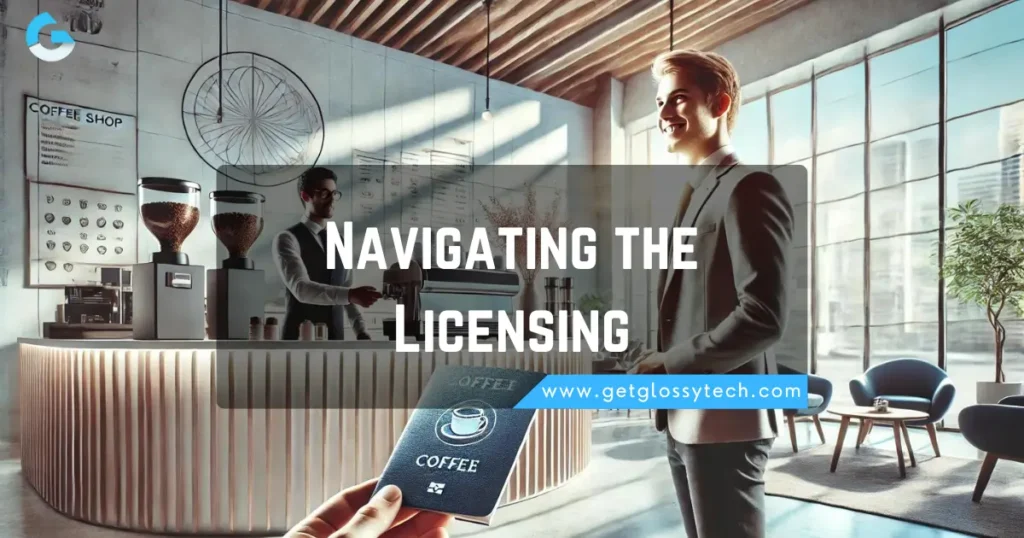
When starting a coffee business, navigating the licensing and permit process can seem overwhelming, but it’s crucial to ensure your coffee shop is fully approved and operates in compliance with all state and local laws and regulations
- First, you’ll need to secure an Employee Identification Number (EIN), which is necessary for hiring employees and paying taxes.
- Next, apply for a Business License and a Doing Business As License (DBA) if you’re operating under a different name than your business registration.
Before you start serving espresso and displaying baked goods in your shop, ensure you’ve prepared all important documents well ahead of time. Licenses like the:
- Retail Food Service License
- Resale License
They are typically required in most areas and don’t forget about Sales Tax permits to legally sell your products. Additionally, if your shop will have a display case showcasing baked goods, you’ll need a:
- Health Permit
- Building Health Permit
- Signage Permit
- Building Permit
- Live Entertainment License
- Insurance
- Food Handler’s Permit
Ensure your space meets health standards and everything is set in place before opening your doors to customers.
6: Designing the Perfect Layout for Your Coffee Shop

Starting a coffee business requires a smart interior design that minimizes steps for baristas to serve customers comfortably. Focus on creating an efficient layout that ensures future success by streamlining operations.
To attract customers and build a comfortable atmosphere, use strategic lighting and colour schemes that align with your brand. Research industry trends and check out potential competitors on social media for inspiration, but let your unique vision for the commercial space shine.
Establish a coffee shop that encourages people to visit on a regular basis by designing a space that’s both inviting and functional. Stay informed, and make your space a reflection of your brand and goals.
7: Crafting the Perfect Coffee Shop Menu
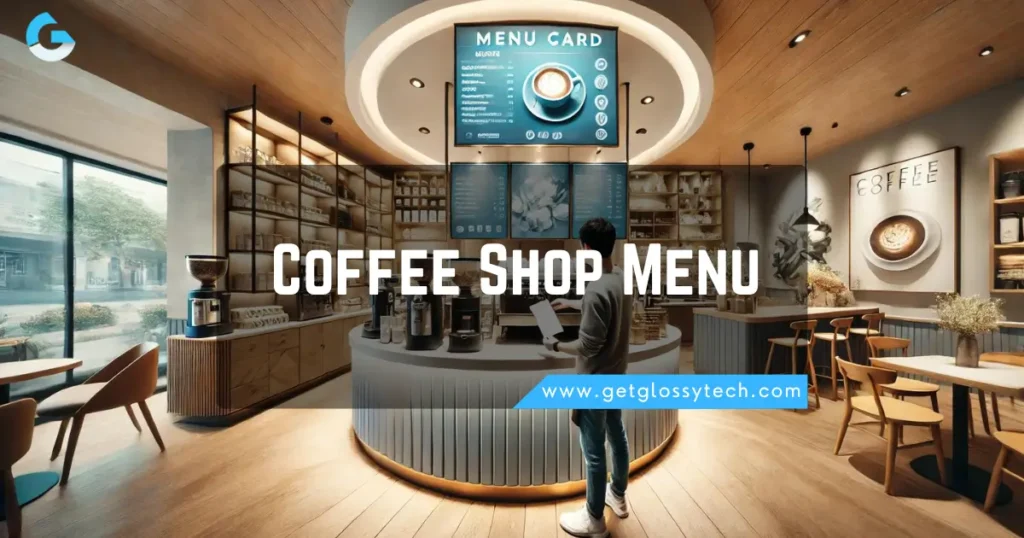
When starting a coffee business, designing a coffee shop menu that resonates with your target market is key to your success. Your menu should not only highlight quality coffee products but also align with your overall branding strategy
Whether you’re offering speciality coffee or baked goods, the items on your menu must be thoughtfully chosen to appeal to your neighbourhood.
Consider your competitors when pricing your coffee products. Pricing should be competitive yet ensure enough revenue to sustain your business. Testing your menu items with focus groups can give you insights into what works and what doesn’t. This approach helps you offer a consistent product that keeps customers coming back.
The Power of Menu Engineering in Your Coffee Shop
Utilize menu engineering to make sure your coffee shop menu is both
- Appealing
- Functional
An online menu or QR code menu can boost sales by making it easy for customers to browse your menu. Using a menu template or restaurant board that reflects your coffee shop’s branding will keep everything aligned with your brand.
Lastly, think of your menu as more than just a list—it’s a vital part of your branding strategy. The right menu will set your coffee shop apart from other restaurants and coffee shops in the area.
8: Essential Equipment You Need to Get Started
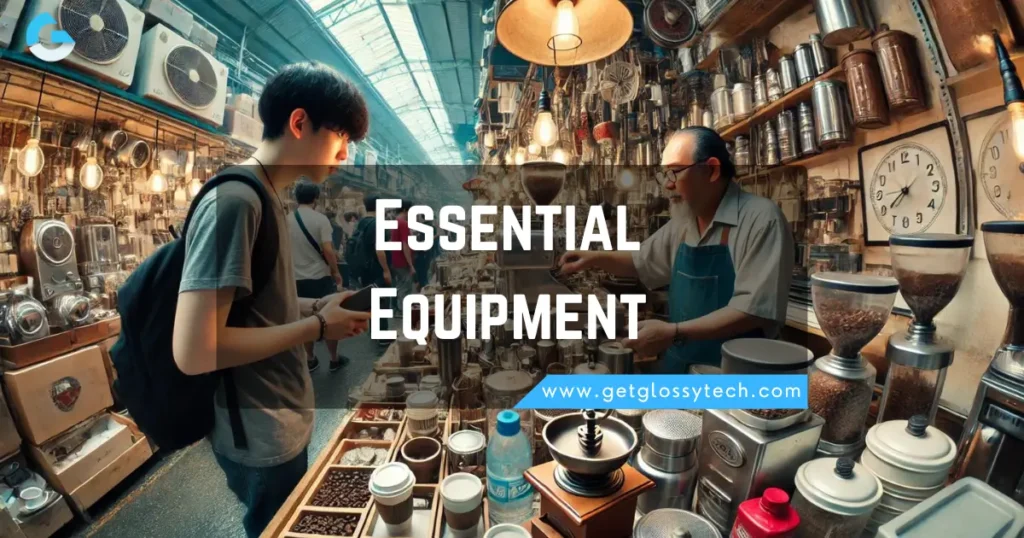
Starting a coffee business requires careful planning, especially when it comes to selecting the right equipment. A successful coffee shop begins with a solid foundation, which includes quality equipment and well-researched purchases.
For your coffee shop to thrive, it’s crucial to invest in tools that ensure a great cup of coffee every time. The key to your business growth and success lies in choosing equipment that aligns with your brand name and meets your customers’ needs.
When setting up your coffee shop, begin with the basics like espresso machines and coffee grinders. These are the heart of your café, delivering the espresso and coffee that will define your brand. Don’t overlook the importance of:
- Refrigeration
- POS
- Hot water
- Blenders
- Filtration
Next on your list should be hot water dispensers, commercial blenders, and water filtration systems. These essentials ensure your coffee shop runs efficiently, offering a variety of beverages and food options. Consider:
- Roasters
- Dishwashers
- Inventory
Finally, consider the furniture and seating arrangements, as well as smaller but essential items like coffee mugs, espresso cups, and aprons. These details contribute to the overall customer experience and the success of your coffee business.
From blenders to syrups, and varieties of milk to condiments, every piece of equipment you choose plays a role in building a successful and sustainable coffee shop.
9: Establish Competitive Pricing

When you’re running a small business coffee shop, your pricing strategy plays a crucial role in your survival. Setting fair prices isn’t just about covering your product costs; it’s about finding a balance that keeps your cash flow steady while ensuring your menu items remain attractive to customers.
Menu engineering becomes key here. You must analyze the performance and profitability of each product to craft a coffee shop menu pricing strategy that highlights the most profitable menu items.
Regular experimentation helps you find that sweet spot where your pricing strategy not only covers costs but also drives financial results. This continuous adjustment ensures that your coffee shop remains profitable in your area:
- Monitor competition and adjust prices accordingly.
- Experiment with different pricing strategies to find what works best.
- Tweak prices based on the popularity and performance of your menu items.
Menu engineering also involves careful adjustment of prices to maintain a balance between profitability and customer satisfaction.
10: Hire and Train your Employees

When opening a coffee shop, start by hiring talented baristas who are passionate about the art of making exceptional coffee. The recruitment process should focus on finding individuals who are knowledgeable and skilled in handling coffee shop equipment.
After hiring, provide comprehensive training that covers everything from brewing techniques to customer service. A well-trained staff will ensure your coffee shop runs smoothly and delivers a top-notch experience for your customers.
11: Develop a marketing strategy

Starting a coffee shop requires more than just a great brew; you need a solid marketing strategy to ensure success. Here’s how you can promote your brand effectively and attract customers:
- Online Presence: Utilize web content by creating a pixel-perfect website and social media to reach a broader audience. Platforms like Instagram, Facebook, and YouTube are key to creating engaging, influential content that resonates with potential customers.
- SEO and Website: Ensure your website is optimized with effective search engine optimization (SEO) to improve visibility and draw in more visitors.
Engage the Community
Building a loyal customer base starts with community involvement. Consider the following promotion ideas to connect with your local community:
- Pop-up Shops and Giveaways: Organize pop-up shops, giveaways, and raffles to increase your brand’s exposure and foster a connection with local customers.
- Networking: Partner with local restaurants and businesses to create mutually beneficial promotions, such as offering free coffee samples at their locations or creating BOGO coupons that can be redeemed at both businesses.
Implement a Comprehensive Marketing Plan
A well-defined marketing plan should be a priority for your coffee business. Here’s how to structure it:
- Paid Advertising: Utilize paid advertising on social media and influencer marketing on platforms like Instagram and LinkedIn to increase visibility.
- Loyalty Programs and Discounts: Implement loyalty programs and offer discounts to encourage repeat customers and ensure steady cash flow.
- Promotional Products: Distribute promotional products such as branded mugs or t-shirts to keep your brand memorable and visible.
12: Offer online coffee ordering
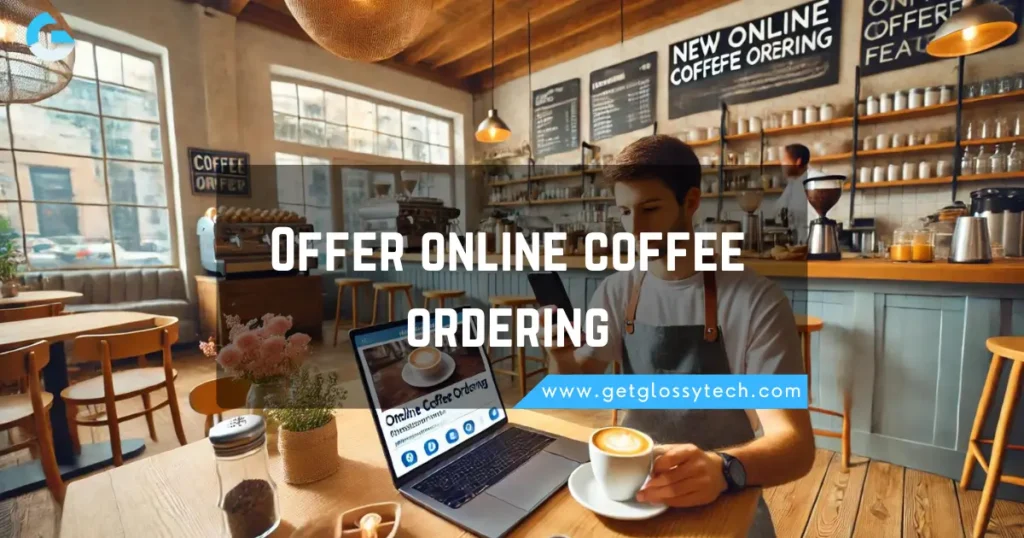
In today’s digital age, establishing an online presence is simple. For modern coffee shops, offering online ordering is crucial—it provides convenience for customers seeking their daily caffeine fixes and promotes repeat business.
By embracing industry trends and using trustworthy technology, you position your shop as a go-to spot for speciality coffee and baked goods. This approach not only keeps you competitive but also enhances customer satisfaction by providing a seamless online ordering experience.
Independent Coffee Shop and a Franchise: Which is Right for You?
If you’re considering opening a coffee shop, you may be wondering if it is better to start a franchise or an independent business. There are many differences between the two business models and the choice will ultimately depend on your personal vision and set of goals. Let’s briefly take a look at both sides of the coin.
Independent Coffee Shop
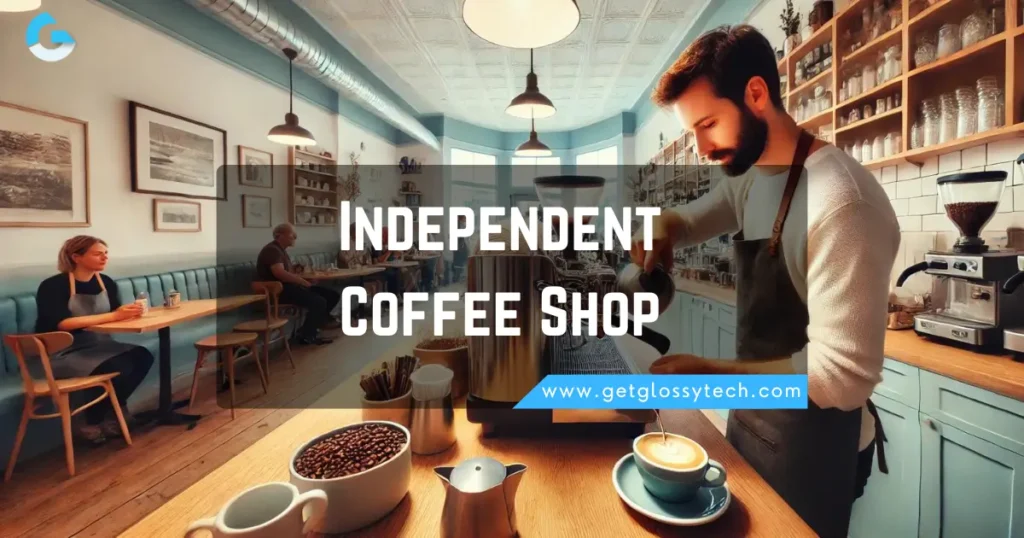
Owning an independent coffee shop allows you to turn your passions into a small business where you can call the shots and create a unique brand. This independence lets you shape your business according to your personal vision, offering more than just coffee—it’s about building a customer base that values your name and what you stand for.
You’re responsible for everything, from the product you serve to the exposure your shop gets. Success in this business means maintaining strong relationships with customers and creating a welcoming space that reflects your freedom and independence.
Franchise Coffee Shop

Opening a franchise coffee shop means buying the right to use a brand name and following a proven formula provided by the company. You’ll get a blueprint for operating the business, including :
- Hours of operation
- Marketing strategies
- Equipment
- Ingredients
The brand’s reputation helps attract customers, but it comes with high startup costs and a continuous fee for using the name. While the potential for success is high, it’s crucial to carefully research the pros and cons and understand the rules and regulations before making your decision.
FAQs: How to Start a Coffee Business

Is the coffee business profitable?
Yes, the coffee business can be profitable due to high demand, low cost of ingredients, and the potential for repeat customers. However, success depends on factors like:
- Location
- Quality
- Effective management
How much does it cost to start a coffee company?
Starting a coffee company typically costs between $80,000 and $300,000, depending on factors like location, equipment, size, and whether it’s an independent shop or a franchise.
What are the monthly expenses of a coffee shop?
Monthly expenses for a coffee shop typically include:
- Rent or mortgage payments
- Utilities (water, electricity, gas)
- Staff wages and benefits
- Supplies (coffee, milk, pastries)
- Equipment maintenance and repair
- Marketing and advertising
- Insurance
- Miscellaneous costs (cleaning supplies, small repairs)
How to increase sales in a cafe?
To increase sales in a cafe, focus on these strategies:
- Enhance your menu: Offer unique items or seasonal specials.
- Boost customer experience: Improve service quality and ambience.
- Promote effectively: Use social media and local advertising or create a website.
- Implement loyalty programs: Encourage repeat business with rewards.
- Optimize pricing: Adjust prices based on cost and customer feedback.
- Host events: Attract more foot traffic with live music or themed nights.
Bottom Line: How to Start a Coffee Business
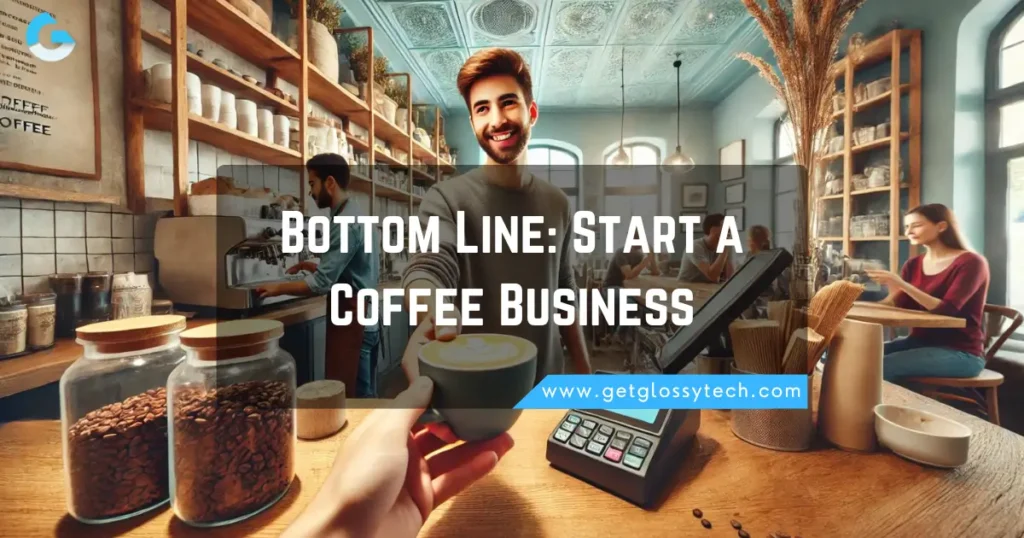
Starting a coffee business is an exciting journey filled with opportunities for creativity and growth. To set yourself up for success, begin with thorough market research to understand your target audience and competitors. Develop a solid business plan that outlines your goals, budget, and strategies.
Choosing the right location, crafting a unique menu, and investing in quality equipment are crucial steps in creating a standout coffee experience. Remember, building strong relationships with suppliers and offering exceptional customer service can make a significant difference in your business’s success.
With passion, preparation, and persistence, you can turn your coffee business vision into a thriving reality.

